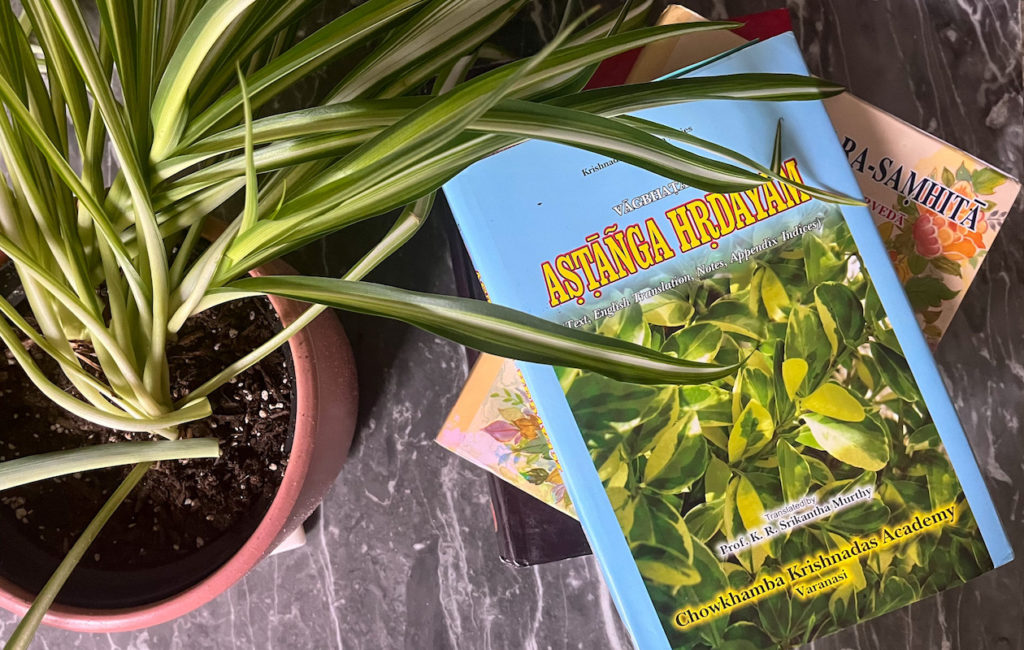Choosing and committing to an Ayurvedic training program is a big decision. And while you know an exciting educational adventure awaits, you may be a little nervous about how you’ll fit your Ayurvedic studies in, while finding life balance.
Finding life balance requires juggling a lot of balls (family/work/school) all at once, and if you don’t have a plan while you do it, you’re destined to drop a few along the way. To help you successfully keep all those balls in the air, we asked Kerala Ayurveda Academy students to share some of the methods they have used in finding life balance, not only in their studies, but in all aspects of life.

Ayurveda is all about balance
The main goal of Ayurveda is to bring balance to your mind, body and spirit. It encourages alignment with the circadian rhythms of nature so you are mentally and physically prepared to live your best, balanced life. The first step to success is finding life balance within yourself which requires a bit of fine tuning for your diet and lifestyle.
Regular mealtimes
Have you ever gotten so busy you completely forgot to eat? Probably not, if you are of Pitta constitution, but everyone can relate to skipping a meal every now and then or eating at times that are not optimal for digestion. Keeping our mind and bodies optimally fueled and our digestion on point requires eating meals at consistent times each day, breakfast (7-9am), lunch (11am-1pm) and dinner (6-8pm).
Regular sleep
In Ayurveda sleep is one of the three pillars of health. Throughout the day, our bodies and brains experience wear and tear. They need sleep – seven to eight hours daily – to rejuvenate. To stay in balance with our natural rhythms, Ayurveda suggests being in bed by 10pm and rising with the sun.
Seasonal shifts
Be aware of the impact of the seasons on your personal body constitution and make adjustments accordingly.
- Summer can be a time of Pitta Dosha aggravation . Take time to cool down and relax more often. Avoid too much heat inducing activity and embrace a little “do nothing” attitude.
- Fall and winter increase Vata Dosha. During this time it’s important to balance Vata with warm, moist food and seek lifestyle activities that are grounding in nature.
- Winter and spring are the Kapha Dosha season. This is a good time to lighten up the foods in your diet, amp up your exercise routine and possibly engage in an Ayurvedic cleanse.
Connect with your dharma or purpose
The Sanskrit word “dharma” translates to your soul’s purpose: your reason for being here on this earth! Connecting with that purpose can provide a great sense of satisfaction as well as energize you to great accomplishments.
- Embrace your purpose and acknowledge you’ve been drawn to explore Ayurvedic study for a reason. Take time to consider why you are choosing the Ayurvedic path and what it means to you; reconnect and recommit with that purpose.
- Allow your relationship to your purpose to shift, and be open to how it manifests itself. It might not look exactly how you imagined it to be, but feel confident it was destined to fit within the whole of your life.

Create new rhythms that support you
Our lives are filled with natural rhythms making us ritualistic and habitual creatures who thrive on patterns and routines. Incorporating learning into your daily rhythms can be easily accomplished if you make a plan and introduce information in digestible portions.
Here’s our top tips for healthy study rhythms:
- Set aside a dedicated time to study each day. Earlier is better as your brain is fresh and distractions typically fewer, allowing for maximum information retention. If finding a full hour isn’t in your cards, then break down your study time into half hour or 15 minute increments. Just make sure whatever time element you choose, that you can devote 100% of yourself to your studies without distraction.
- Read your course manuals or view lecture material during your commute if you use public transportation. Bring headphones to block out noisy distractions.
- Set small, attainable goals such as reading a certain number of pages per day/week or viewing a specific number of minutes/hours of lecture. The same goes for larger assignments and projects. Don’t procrastinate, just get started and whittle away the larger tasks in a manageable way. And… don’t forget to reward yourself when your goals are accomplished!
- Get to know your fellow students and join networking groups. Many of our students form groups within their cohort to stay in touch. It’s helpful to communicate with people who can relate to your situation. These groups also offer a wealth of additional information, resources and accountability.
- Schedule a monthly check in with your Student Mentor. Use this time to brainstorm on the best protocol for your rogi consultations, discuss special projects and gain ideas on how to carry forward with your new found knowledge after graduation.
- Read your materials before class. This will help you to better retain lecture information and pre-formulate questions to expand on learning.
Set and communicate new expectations and boundaries with people in your life
Strong relationships with your partner, children, family and friends are important. They will be impacted by the changes in your life, but there is nothing to fear. If you’re on a positive growth path, the positivity can spread to them as well.
Open an upfront dialogue with people in your life
Be clear with your friends/family about the impact your studies will have on your time and attention for them. Engage in an open and honest conversation as to how you can work together to navigate obstacles, set boundaries and meet expectations.
Share your Ayurvedic wisdom with those that surround you
Invite people into this new and exciting part of your life! The discussion will make them feel included in your journey and give you practice in framing information for future rogi discussions. It may even warm them up to volunteering as part of your clinical case studies. Just be mindful of reading your audience during this process so as not to put people and their personal health on the spot.
Don’t forget to include your boss and coworkers in the discussions
Make sure people in your workplace are aware of times when you need to attend classes and internships. Request any needed leave well in advance and clearly mark your calendar so all are aware of when you’ll be unavailable. Share your Ayurvedic knowledge, if appropriate. Consider your “work family” as an audience for a wellness discussion, yoga session or guided breathwork/meditation.

Rejuvenation and self care
When life gets busy, there’s one person that is often forgotten. You! Self-care is important to ensure you perform at your best, stay energized and focused.
Actually schedule your self-care
Schedule some mental self-care into your calendar, even if it’s a 5 minute date for a little breath work, gratitude journaling or meditation. Mental wellbeing is key to minimizing stress and anxiety, increasing your positivity, building confidence and helping you avoid burnout. And don’t forget your body. Make sure to get plenty of rest, make time for exercise and keep your body fueled consistently with wholesome, energizing meals. Schedule all the aforementioned if you find that you otherwise miss them.
Prioritize and make shifts
Take a look at your to-do list. Being busy doesn’t always equal being productive. Are you spending too much time on what feels urgent and not enough time on what is important? Realize it’s OK to say “no” sometimes. Let the important things be your priorities and forget about the rest, for now.
Slow your roll
Avoid multitasking and take a quality over quantity approach. Give each aspect of your life it’s full, deserved attention. When you multitask you may feel like you’re getting more accomplished but in fact, it can impact your memory, result in mistakes and actually eat up more of your time as your brain resets to follow each task.

In finding life balance, we must consider the life we have and those that surround us and then make adjustments that will allow us to personally grow, fulfill our dharma and find happiness. The first steps of an educational journey are often the hardest, but if we take them with confidence and a little planning, we’ll easily complete our journey to success.
To start planning your Ayurvedic educational journey, follow the links to learn more about our upcoming Holistic Health Coach, Ayurvedic Health Counselor and/or Ayurvedic Practitioner programs.






